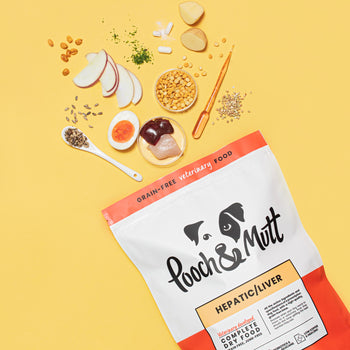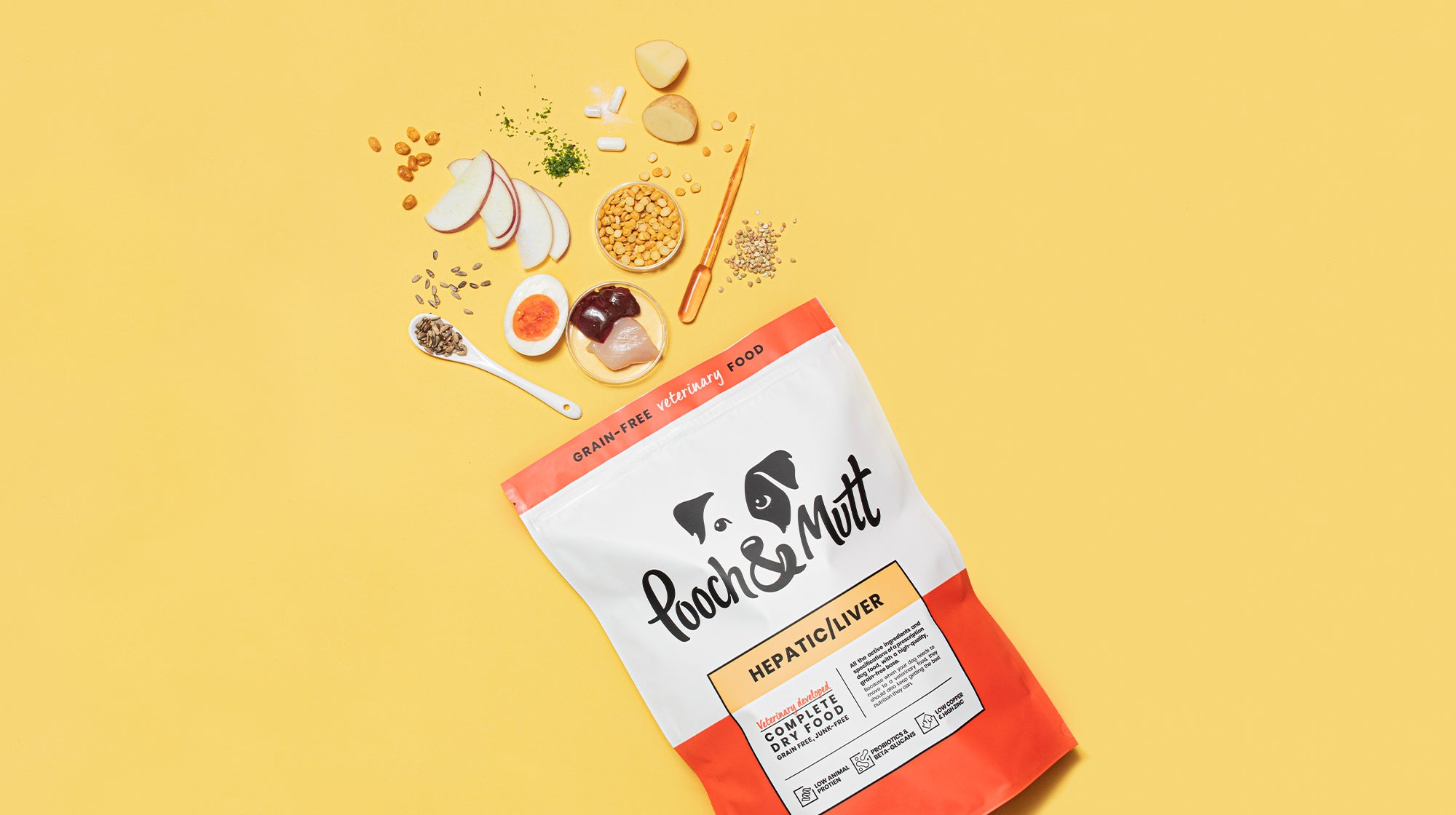
FREE UK DELIVERY ON ORDERS OVER £39.99
If your dog has been diagnosed with liver disease, you might understandably be a worried pooch parent. You may wonder: what does liver disease mean for a dog, what are the symptoms, and how do you understand and treat the different stages of liver disease? Also, if a dog has liver disease, do you switch their food? What should they eat?
It’s completely normal to have so many questions - after all, our dogs are such beloved members of the family and we just want them to be healthy and as happy as they can be. In this article, we’ll explain the symptoms, stages and treatment of liver disease in dogs, so that you’ll feel more confident and well equipped for whatever stage of the condition your pooch is in.
Liver disease is relatively common in dogs and can affect all breeds and ages. There’s a lot of variation in what contributes to the condition:
So, what to look out for? It can be tough to spot liver disease in your dog, as the common symptoms could relate to many other illnesses or conditions. In any case, take your pooch to a vet to be tested if you spot any of the following:
In some cases, liver disease in dogs can lead to a secondary illness called hepatic encephalopathy - a brain condition. It might seem strange for a change in liver function to impact the brain, and really, it’s not entirely understood. As the liver is responsible for filtering toxins from the blood, it’s thought that changes in blood chemistry caused by a deteriorated liver can cause the brain to dysfunction.
It’s most commonly linked to a portosystemic shunt in dogs (a particular liver condition) - but can also occur after acute liver failure or alongside severe/late stage liver disease.
Once you’ve noticed your dog isn’t acting quite themselves and you’ve taken them to the vets, it’s likely the vet will carry out a few tests, such as blood tests, x-rays or an ultrasound. If the tests show that the liver isn’t functioning normally, they may carry out a biopsy on your dog to remove tissue for further testing.
From there, they’ll know the type of liver disease your dog is suffering from and how advanced it is, and should instruct you on the best way to manage it.

The severity of your dog’s symptoms could indicate how advanced their liver disease has become. Generally, liver disease progression is defined by early stages and late stages…
When liver disease is in its early stages, your pooch may display mild symptoms such as decreased appetite, some weight loss, or peeing and drinking more frequently. They might get the odd bout of sickness and diarrhoea. The early stages can be hard to detect, as these symptoms can seem mundane and easily go under the radar. If you have any suspicions that things aren’t right, get your pooch to the vet for a check up.
During the more advanced stages of liver disease, symptoms are more severe, as the liver’s inability to function causes your pooch to become more unwell. Your dog might be generally lethargic and weak, have jaundice of the eyes, gums and tongue, an inability to hold their pee means they may urinate in the house, and they may vomit, get diarrhoea and go off their food.
When it comes to treatment, getting the right food is an important step to manage liver disease in dogs - as if their liver can’t process what they eat it will significantly worsen symptoms and make the dog miserable. Treatment for a dog’s liver dysfunction depends on how advanced the damage is, and could be a combination of the following:

It can be tough to know what to feed a dog with liver disease, but it’s usually vital for their treatment that they’re switched to a hepatic diet. Your vet will likely suggest a hepatic dog food as it’s specially formulated to provide your dog with all the nutrition and supplements they need without putting undue stress on the liver. Hepatic dog food needs to be extra appetising, too, as dogs with a dodgy liver often don’t want to eat.
For dogs with liver issues who also have a grain allergy or who prefer a grain-free diet, Pooch & Mutt has made a specialist dog food for liver disease that contains zero grain. Unlike other prescription hepatic foods, we’ve boosted flavour by adding delicious chicken skin and salmon oil - the perfect amount of succulent fats to make it irresistible to dogs who may have gone off their food. To top it off, we’ve added milk thistle - its natural nutrients are excellent for liver function.
Whether a dog can be ‘cured’ of liver disease really depends on the stage of progression and the cause (for instance, if your pooch has liver damage as a part of diabetes, it would be dependent on the diabetes improving).
Liver disease tends to be progressive, and the damage already done to the liver rarely goes in reverse. However, in many cases liver disease can be managed and slowed so that a dog can live out their days happily. Staying ahead of symptoms, feeding them the right food, and maintaining regular check-ups with the vet will improve your dog’s everyday quality of life and hopefully extend their life, too.
If your pooch has liver disease, you’ll probably have a lot on your mind in regards to getting them the best treatment possible. That’s why Pooch & Mutt has formulated a range of vet-recommended specialist foods for dogs with specific health conditions, including our Veterinary Food for Liver Disease. We’ve created the exact right balance of proteins, nutrients and supplements so rather than fuss over food, you can just focus on caring for and loving your dog every day.
If you want to learn more about what to feed your dog if they have liver problems, check out our blog here.





Never miss a treat!
Subscribe to our newsletter and get blog articles amongst other treats delivered to your inbox

Comments (14)
My dog Sweetheart has been diagnosed with Liver failure and I finally was able to get her going after 2 weeks hard work. We have a marvelous vet who has put her on nausea meds, meds for aches and pains, and a liver builder. She has improved considerably, but diet is a problem. She’s back to eating eggs, some chicken with broth,, salmon and tuna with juice. Does your food for Liver support recovery, or is there anything more you can suggest? She is 15 years young. Thanks for your help. Nandy
Hi Nancy, I asked vet Linda about this for you and she has advised “It isn’t a specific recovery food (so not e.g. higher in calories) but it is specifically designed to support the liver and is advised for those with hepatic disease.” If you are unsure, we would advise double checking with your own vet if our food would be suitable. :)
My dog had neck surgery earlier in the year and they found his liver enzymes were elevated. Did testing on him for cushions disease which were negative. He has become weak in his legs. Ive had him on cooked chicken, carrots & green peas along with dry food to give him the grains he needs. He has done well 8 months after surgery but now, all of a sudden, he has developed weak legs and tends to have “spells” after he eats. He cowers and finds a quite place to hide and takes a few hours to recover. I don’t know if its his liver and his vet says he would need to biopsy it. Says nothing about blood tests. I am at a loss. What food do I need to be feeding my dog to improve his health or is it too late. I am currently looking at putting him out of this pain and misery and that is not an easy decision to make. Is it too late for my pup? He is 7 years old.
Hi Lori,
We would advise checking with your vet whether your pooch needs to be on a specific diet for their health needs. If your vet suggests a hepatic diet, then our Hepatic dry food from our vet range would be ideal. If you want to discuss this further, please contact the team on [email protected]
My dog is 10 yr old shitzu/ poodle mix… she recently had an episode of seizure which lasted a minute….when X-rays were taken it showed her liver was enlarged but her blood report came back negative…. I’m confused. Dr wants to do ultra sound but I’m not sure if she should because her blood report didn’t say anything…. Will only change of diet help??
Our dog has recently been diagnosed with liver disease awaiting scan been advised to change food as on a high protein diet your hepatic food sounds perfect but notice it has eggs in which she’s allergic too she also has to have it rice free have you any other alternatives please
Our dog is an English Springer Spainel aged 10 years 2 months
Any advice greatly appreciated
Hi Janice, I am very sorry but we only have the one type of Hepatic food at the moment that would be suitable for your pooch and this does contain egg, I really apologise about this!
I have a 6 year old female with liver problems, do I have to have a veterinarian prescription to order hepatic dry dog food?
Hi Daron,
You do not need a prescription to order this food, but we would advise only feeding this food if your vet has recommended a hepatic diet. :)
My dog has liver inflammation and has gone from a dog who only eats when hungry to a very greedy do she is on hepatic food and she is a bedlington terrier
My dog has recently been diagnosed with stage 2 liver disease, she is 14 years old with no teeth and wondered if you do a wet food?
Hi Jules,
We are sorry to hear this and do hope your pooch is doing ok! Unfortunately, we do not have any wet foods currently suitable for dogs with liver disease. Many pawrents do however like to soak our Hepatic food in warm water if they do need it to be a little softer/easier to digest. I will pass this feedback on as we are always working on expanding our range and hopefully in the near future we have further options which are suitable! :)
Hope you can help my god is nearly 4 yrs as tested for liver damage he is a very fussy eater but now won’t eat the vet has put him on medication twice a day.The only systems he has is water drinking and wees a lot of both since taking the medication he is not drinking much and not veering as much.The problem I have if he won’t eat I can’t give him his tablets .HELP
Thanking you
Tom
Hi Tom,
Oh goodness, we would advise speaking with your vet on this, as they know your pooches history best and there may be another reason why they are refusing to eat. Hopefully they can offer some help or advice here.
Leave a comment